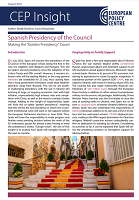Spanish Presidency of the Council: Making the “Golden Presidency” Count
Spanish Presidency of the Council: Making the “Golden Presidency” Count
Author(s): Đorđe Dimitrov
Subject(s): Security and defense, Electoral systems, EU-Approach / EU-Accession / EU-Development, Peace and Conflict Studies, Russian Aggression against Ukraine
Published by: Centar za evropske politike CEP
Keywords: Spain EU presidency 2023; European Union challenges; war in Ukraine; economic crisis; climate change; EU institutional cycle; Spain EU leadership; European Parliament elections 2024;
Summary/Abstract: In July 2023, Spain will assume the presidency of the Council of the European Union, being the first in the new trio together with Belgium and Hungary. This will be Spain’s second presidency since the adoption of the Lisbon Treaty and fifth overall. However, it remains unknown who will be leading Madrid, as the snap general elections are scheduled for 23 July, thus causing fears that a long government formation could draw Madrid’s attention away from Brussels. This will be yet another challenging presidency, with the war in Ukraine still looming at large, an ongoing economic crisis with high inflation, unprecedently high interest rates and competition with China, as well as the need to combat climate change. Adding to the weight of responsibility, Spain will hold the so-called “golden presidency”, meaning that this will be the last presidency in which the incumbent institutional cycle will work in full capacity before the European Parliament elections in June 2024. Thus, Spain will have the responsibility to make progress and finalise many pending dossiers before the work of the EU institutions pauses for almost a year. Having in mind the presidency’s motto, “Europe-closer”, the aim of this insight is to analyse how Spain will navigate Europe in the next six months.
Series: Centar za evropske politike - POGLEDI
- Page Count: 4
- Publication Year: 2023
- Language: English
- Content File-PDF

